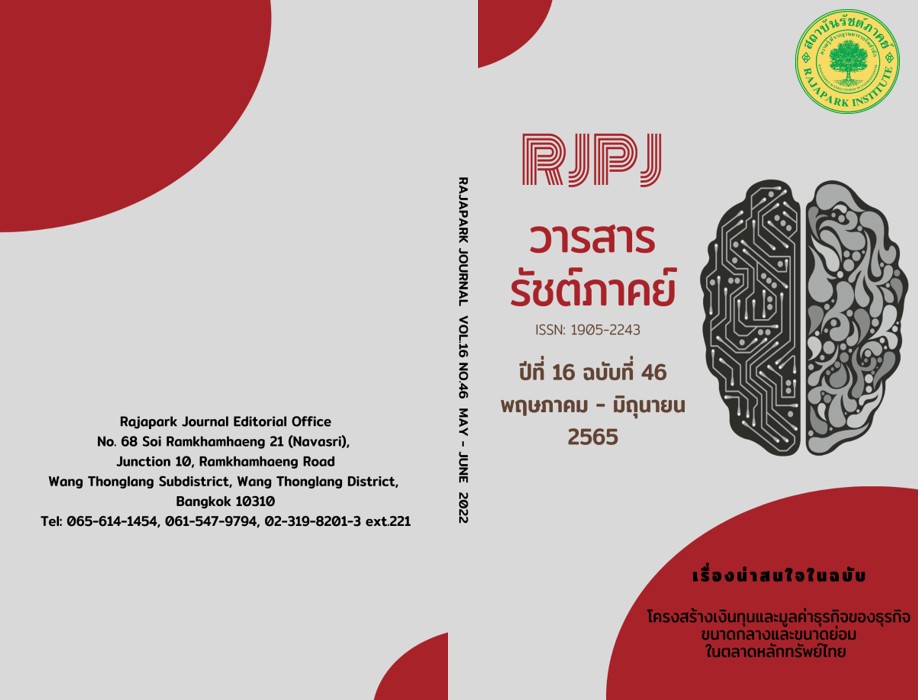The Development of Knowledge, Understanding, and Opinions of the Students Towards “Sustainable Development Goals” by Using Problem-based Learning Activities in the Subject of Active Citizens (SWU 261)
Main Article Content
Abstract
The objectives of this research were to: (1) study the drive of the SDGs from international actors; (2) study and evaluate knowledge and understanding of students toward Goal 14; (3) study students' attitudes toward Goal 14; (4) develop and test the problem-based learning technique process; and (5) compare the knowledge and understanding of the treatment and control group by using the problem-based learning activity. This study was mixed-method research, which consisted of two stages: (1) qualitative method: the sample consisted of ten educational institute executives and scholars. Data were collected through in-depth interviews and analyzed using content analysis; and (2) qualitative and quantitative methods: the sample consisted of 74 second-year undergraduate students from Srinakharinwirot University. Data were analyzed using basic statistics and t-tests. Moreover, data were collected via a focus group with a total of 23 students. The content analysis method was used. The research results were as follows: (1) Thailand's concern about the SDGs by the United Nations, which has been driven by making an agenda, cascading an agenda, and monitoring an application of this concept into the country and educational institutions is an actor that could help to develop knowledge and understanding; and (2) the PBL process could help to promote students’ knowledge and understanding at a high level and was statistically significant at a 0.05 level.
Article Details

This work is licensed under a Creative Commons Attribution-NonCommercial-NoDerivatives 4.0 International License.
Views and opinions appearing in the Journal it is the responsibility of the author of the article, and does not constitute the view and responsibility of the editorial team.
References
Adultrakul, A., Potjanamar, H., & SawangJaiThum, K. (2015). Effects of Problem Based Learning Towards Knowledge on Sex Education and Opinions on Sex Risk Behaviors among Mutthayomsuksa Students. Nursing Journal. 42, 46-56.
Caldwell, D., & Williams Jr., R.E. (2006). Seeking Security in an Insecure World. Rowman & Littlefield.
Fierke, K.M. (2016). Constructivism. In International Relations Theories: Discipline and Diversity. Edited by Tim Dunne; Milja Kurki; and Steve Smith. Pp.162. Oxford University.
Finnemore, M., & Sikkink, K. (1998). International Norm Dynamics and Political Change. International Organization. 52(4), 887-917. https://www.jstor.org/stable/2601361
Hmelo-Silver, C. E. (2004). Problem-based Learning: What and How Do Students Learn?. Educational Psychology Review. 16(3), 235-266.
Ingchatcharoen, S. (2014). Development of the Quality Rating Models Across Groups of Raters in Problem-based Learning: An Application of Many-facet Rasch Measurement[Doctoral Dissertation, Chulalongkorn University].
Institute for Innovative Learning. (2019). Bloom’s Taxonomy. https://il.mahidol.ac.th/
Jai-on, K., & Bangtho, K. (2020). Using Problem-based Learning Approach to Enhance Student Teachers’ Lesson Design Ability for 21st Century. Journal of Education Naresuan University. 24(1), 99-109.
Jaisook, S. (2012). The Development of an Instructional Model by Integrating Problem-based Learning and Collaborative Learning Approaches to Enhance Mathematical Problem Solving, Communication and Connection Abilities of Sixth Grade Students[Doctoral Dissertation, Chulalongkorn University].
Jantra, K., & Isarankura Na Ayudhaya, W. (2014). Effects of Organizing Problem-based Learning Activities in Social Studies Subject on Problem Solving Abilities and Social Responsibilities of Eleventh Grade Students. Online Journal of Education, 9(1), 42-55.
Johnston, A.I. (2008). Social States: China in International Institutions, 1980-2000. Princeton University.
Makmee, P. (2011). Problem-based Learning. EAU Heritage Journal, 1(1), 7-14.
Ministry of Interior. (2017). Sustainable Development Goals and Ministry of Interior. http://122.155.1.141/upload/minisite/file_attach/229/5b1e24134 b844.pdf
National Strategy Secretariat Office, Office of the National Economic and Social Development Board. (2018). National Security: 2018-2037. http://nscr.nesdb.go.th/wp-content/ uploads/2019/10/National-Strategy-Eng-Final-25-OCT-2019.pdf
Pati, A. (2016). Knowledge, Understanding and Opinions of Local People towards Homeless People Protection: A Case Study of People in Pha Sing Sub-district, Mueang District, Nan Province[Master’s Thesis, Thammasat University].
Pinitpuvadol, K., Neamhom, K., & Rajapongsa, P. (2016). Quick Research on the Urgent Issue of ASEAN Community: Sustainable Development. International Institute for Trade and Development.
Saengduangdee, V. (2014). Development of a Blended Instructional Model Using Critical Problem-based Learning to Enhance Ethical Decision-making Ability in Journalistic Profession [Doctoral Dissertation, Chulalongkorn University].
Schimmelfenning, F. (2000). International Socialization in the New Europe: Rational Action in an Institutional Environment. European Journal of International Relations, 6(1), 109-139. DOI:10.1177/1354066100006001005
Seangyai, K., & Wisutthirattanakun, S. (2021). The Achievement of the Sustainable Development Goals for the Development of Thailand. Rajapark Journal, 15(43), 14-24.
Tubtimthawechok, N. (2013). Cognition and the Opinion of Rice Farmer on Income Guarantee Scheme in The Southern Isan Provinces Groups, Thailand[Master of Science, National Institute of Development Administration].
United Nations. (2015). From MDGs to SDGs. https://un.or.th/globalgoals/th/the-goals/
Wongratana, C. (2007). Statistical Techniques for Research. Thainaramitkij Inter Progressive.


